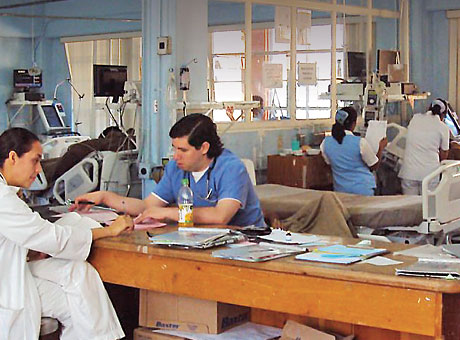
Global Health Scholars learn sensitivity to other cultures and develop solutions in resource-limited environments, such as this ICU in Guatemala City.

Global Health Scholars learn sensitivity to other cultures and develop solutions in resource-limited environments, such as this ICU in Guatemala City.
A catalyst for innovation, the Global Health Scholars in Medicine program takes residents out of the academic medical setting with its latest technologies and collaborative, multidisciplinary teams and places them in underresourced parts of the world.
On these month-long rotations, medical residents hone their skills — overcoming language barriers, broken equipment and cultural sensitivities. Often, they work without the benefit of a translator, attending physician or nearby lab.
These new physicians gain a global mindset, understanding not only disease, but also the impact of culture and poverty on public health.
Ten residents are selected yearly to participate in the highly competitive program administered by the Department of Internal Medicine.
The program began in 2007 with support from Jack Ladenson, PhD, the Oree M. Carroll and Lillian B. Ladenson Professor of Clinical Chemistry. Ladenson and David Windus, MD, professor of medicine, led residents to Eritrea and Bhutan to create diabetes education and disease management programs. Now it includes more faculty and sites in Honduras, India, Japan and Guatemala. Also, the program offers a locally based “international” rotation: students work with refugees and the homeless in St. Louis — people they might not typically see during an inpatient rotation — at Family Care Health Centers and Casa de Salud.
Scholars conduct research, develop outreach initiatives and share best practices.
“It strengthens several aspects of our curriculum, including training in cultural sensitivity and preventive care,” said Melvin Blanchard, MD, FACP, chief of the Division of Medical Education. “As a university with a global view, we hope that our trainees develop an appreciation for the wider world in which we live and become engaged in a manner that advances longevity and a high quality of life in our immediate community and abroad.”
Rachel Kilpatrick, MD, an endocrinology fellow at the School of Medicine, finished a rotation in Eritrea and now hopes to work with Hispanic immigrants. “I’m motivated to work with the underserved here in the United States, particularly with immigrant populations that may have difficult access to care,” she said. “My time as a Global Health Scholar was one of the most valuable experiences of my entire medical training so far.”